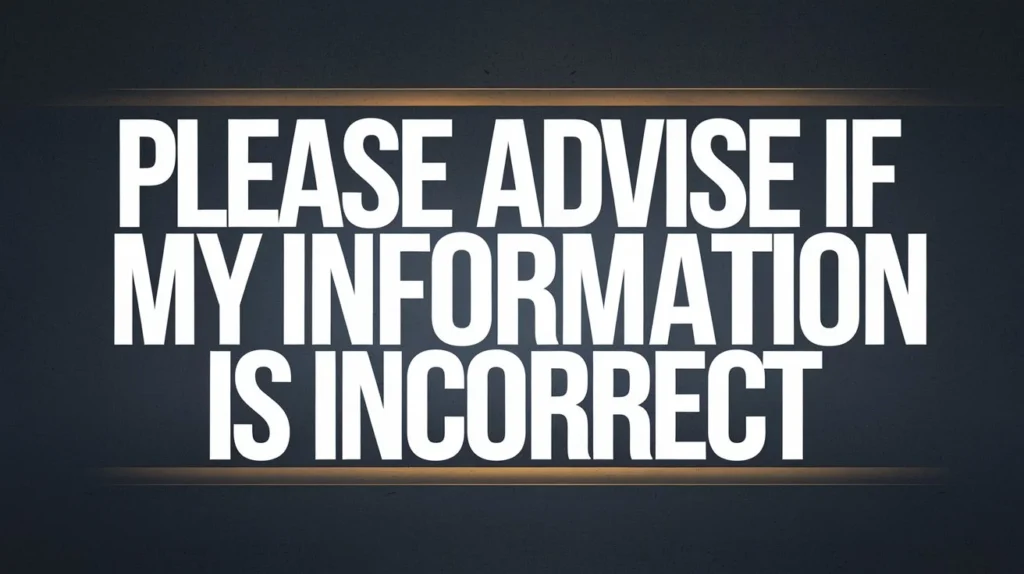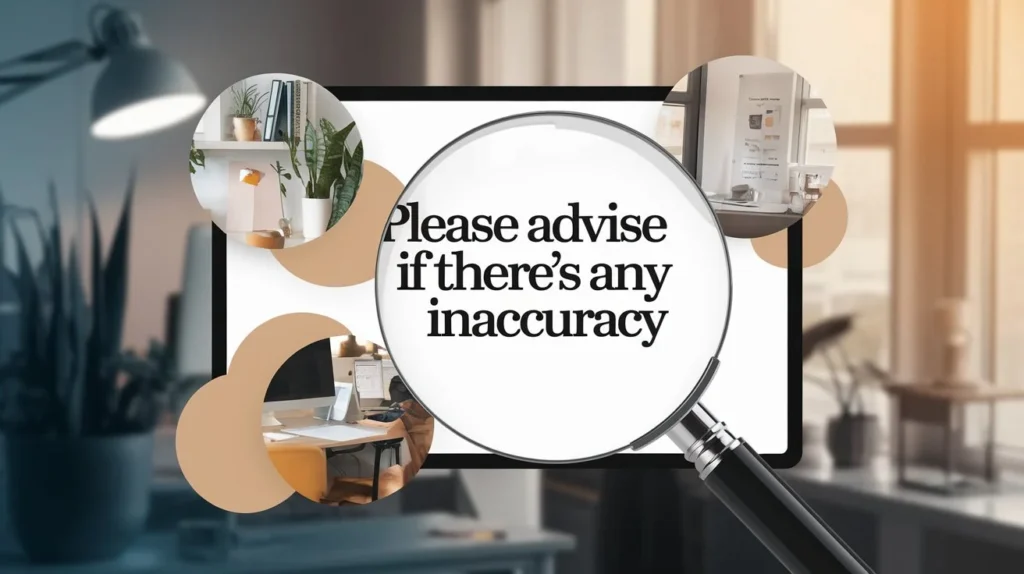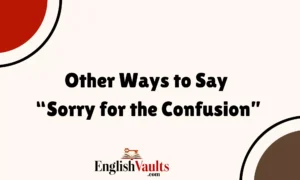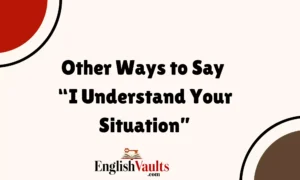When communicating, especially in formal or professional settings, it’s important to invite correction respectfully and constructively. Here are 25 alternative phrases to convey the request for correction, each accompanied by a practical scenario to illustrate its use.
List of 25 Synonyms for “Please Correct Me if I Am Wrong”
- 1. Feel Free to Correct Me If I’m Mistaken
- 2. Please Let Me Know If I Have Misunderstood Anything
- 3. If I’m Incorrect, Please Point It Out
- 4. Correct Me If I’ve Got This Wrong
- 5. Please Advise If My Understanding Is Incorrect
- 6. Let Me Know If I’ve Made a Mistake
- 7. Please Inform Me If I’m Wrong
- 8. If I’ve Misinterpreted, Please Let Me Know
- 9. Please Correct Me If I’m Off-Track
- 10. If I’m Not Correct, Kindly Let Me Know
- 11. Please Advise If My Information Is Incorrect
- 12. If I’ve Got It Wrong, Please Let Me Know
- 13. Please Clarify If My Understanding Is Inaccurate
- 14. Kindly Correct Me If My Assumptions Are Wrong
- 15. Please Let Me Know If I’ve Made an Error
- 16. If I’m Wrong, Please Point It Out
- 17. If I’ve Got the Facts Wrong, Please Correct Me
- 18. Please Indicate If I’ve Misunderstood Anything
- 19. Please Let Me Know If There Are Any Mistakes in My Summary
- 20. If I’ve Missed Anything, Please Advise
- 21. Please Point Out Any Errors in My Interpretation
- 22. If I’ve Made an Oversight, Please Let Me Know
- 23. Kindly Inform Me If My Details Are Incorrect
- 24. Please Advise If There’s Any Inaccuracy
- 25. If There Are Errors in My Understanding, Please Correct Them
1. Feel Free to Correct Me If I’m Mistaken
Scenario:
Email Subject: Clarification on Project Specifications
Hi Leo,
I hope you’re doing well.
I wanted to confirm the details regarding the new project specifications. My understanding is that we are focusing on the market analysis first and then the development phase. Feel free to correct me if I’m mistaken. I want to ensure we are aligned before moving forward.
Best regards, Henry
Addition:
Using “feel free to correct me if I’m mistaken” is a polite way to invite clarification. It conveys openness to feedback and ensures mutual understanding.
2. Please Let Me Know If I Have Misunderstood Anything

Scenario:
Email Subject: Review of Financial Reports
Dear Leo,
I hope this email finds you well.
I have reviewed the financial reports and my interpretation is that the revenue projections for Q3 have been adjusted downward. Please let me know if I have misunderstood anything. I want to make sure my analysis aligns with the latest figures.
Best, Henry
Addition:
This phrase is useful for confirming whether your understanding is accurate. It emphasizes a willingness to adjust your understanding based on feedback.
3. If I’m Incorrect, Please Point It Out
Scenario:
Email Subject: Update on Marketing Strategy
Hi Leo,
I hope you’re having a great day.
Based on our last discussion, I believe we’re shifting our focus to digital channels this quarter. If I’m incorrect, please point it out. I want to ensure that our strategy is correctly aligned with your expectations.
Best regards, Henry
Addition:
“Please point it out if I’m incorrect” is a direct approach that encourages correction and ensures clarity in communication.
4. Correct Me If I’ve Got This Wrong
Scenario:
Email Subject: Details on Upcoming Presentation
Dear Leo,
I hope you’re well.
For the upcoming presentation, my understanding is that we are emphasizing the new product features and market benefits. Correct me if I’ve got this wrong. It’s important to ensure that the content accurately reflects our goals.
Warm regards, Henry
Addition:
This phrase is informal yet polite, making it suitable for collaborative environments where you want to confirm details with your colleague.
5. Please Advise If My Understanding Is Incorrect
Scenario:
Email Subject: Clarification Needed on Project Deadlines
Hi Leo,
I trust you’re doing well.
I am working on the project schedule and my notes indicate that the final deliverable is due by the end of next month. Please advise if my understanding is incorrect. I want to make sure our timelines are accurate.
Best, Henry
Addition:
“Please advise if my understanding is incorrect” is a formal and respectful way to seek clarification, particularly useful in written communication.
6. Let Me Know If I’ve Made a Mistake
Scenario:
Email Subject: Confirmation of Team Assignments
Dear Leo,
I hope you’re having a good day.
I’ve assigned tasks to the team based on our last meeting, with each member focusing on their respective areas. Let me know if I’ve made a mistake in the assignments. I want to ensure that everyone’s roles are correctly defined.
Best regards, Henry
Addition:
This phrase invites feedback in a straightforward manner, which helps in promptly addressing any errors in task assignments or other details.
7. Please Inform Me If I’m Wrong
Scenario:
Email Subject: Review of Contract Terms
Hi Leo,
I hope this message finds you well.
I have reviewed the contract terms and my understanding is that the delivery schedule is set for Q4. Please inform me if I’m wrong. Accurate terms are crucial for our planning and execution.
Best, Henry
Addition:
“Please inform me if I’m wrong” is a direct request for correction, ensuring that any inaccuracies are addressed swiftly.
8. If I’ve Misinterpreted, Please Let Me Know
Scenario:
Email Subject: Summary of Recent Meeting
Dear Leo,
I hope you’re well.
I’ve summarized the key points from our recent meeting, focusing on the project milestones and deadlines. If I’ve misinterpreted, please let me know. I want to ensure that our notes accurately reflect the discussion.
Warm regards, Henry
Addition:
This phrase shows an openness to correction and helps ensure that your interpretation aligns with what was discussed.
9. Please Correct Me If I’m Off-Track
Scenario:
Email Subject: Feedback on Proposal Draft
Hi Leo,
I trust you’re doing well.
I’ve drafted the proposal based on our initial discussions and have included the major project goals and budget estimates. Please correct me if I’m off-track. Your feedback will help refine the proposal before submission.
Best regards, Henry
Addition:
“Please correct me if I’m off-track” is effective for ensuring that you’re on the right path with your work or ideas.
10. If I’m Not Correct, Kindly Let Me Know
Scenario:
Email Subject: Update on Research Findings
Dear Leo,
I hope you’re having a productive week.
Based on the latest data, my analysis indicates a trend in increasing customer satisfaction. If I’m not correct, kindly let me know. It’s essential that our findings are accurate for the upcoming report.
Best, Henry
Addition:
This phrase is polite and professional, making it ideal for formal communication where accuracy is critical.
11. Please Advise If My Information Is Incorrect

Scenario:
Email Subject: Verification of Sales Data
Hi Leo,
I hope you’re doing well.
I’ve compiled the sales data for the last quarter, and my summary shows a 10% increase in sales. Please advise if my information is incorrect. Accurate data is crucial for our performance review.
Best regards, Henry
Addition:
“Please advise if my information is incorrect” provides a clear request for verification, helping to ensure data accuracy.
12. If I’ve Got It Wrong, Please Let Me Know
Scenario:
Email Subject: Review of Budget Allocation
Dear Leo,
I hope this message finds you well.
I’ve reviewed the budget allocation for the upcoming project and allocated funds based on our priorities. If I’ve got it wrong, please let me know. Correct budgeting is important for the project’s success.
Warm regards, Henry
Addition:
This phrase is conversational and invites correction in a non-confrontational manner, suitable for collaborative settings.
13. Please Clarify If My Understanding Is Inaccurate
Scenario:
Email Subject: Follow-Up on Project Goals
Hi Leo,
I hope you’re having a great day.
I’ve outlined the project goals as discussed, focusing on the key deliverables and deadlines. Please clarify if my understanding is inaccurate. Ensuring we’re on the same page is crucial for the project’s success.
Best regards, Henry
Addition:
“Please clarify if my understanding is inaccurate” emphasizes the need for precision and clear communication.
14. Kindly Correct Me If My Assumptions Are Wrong
Scenario:
Email Subject: Review of Strategic Plan
Dear Leo,
I hope you’re doing well.
I’ve drafted the strategic plan with the assumption that our focus will be on expanding market share. Kindly correct me if my assumptions are wrong. It’s important that the plan aligns with our strategic goals.
Best, Henry
Addition:
This phrase is polite and acknowledges that your assumptions may need adjusting based on feedback.
15. Please Let Me Know If I’ve Made an Error
Scenario:
Email Subject: Confirmation of New Policy Details
Hi Leo,
I hope this email finds you well.
I’ve summarized the details of the new policy as per our meeting. Please let me know if I’ve made an error in the details. Accurate policy information is essential for effective implementation.
Best regards, Henry
Addition:
“Please let me know if I’ve made an error” is a courteous way to invite corrections and ensure accuracy in communication.
16. If I’m Wrong, Please Point It Out
Scenario:
Email Subject: Summary of Training Sessions
Dear Leo,
I hope you’re having a productive day.
I’ve compiled the key points from our recent training sessions. If I’m wrong, please point it out. Your feedback will help ensure the accuracy of our training records.
Warm regards, Henry
Addition:
This phrase is direct and encourages specific feedback, which can help in promptly correcting any mistakes.
17. If I’ve Got the Facts Wrong, Please Correct Me
Scenario:
Email Subject: Review of Market Research Data
Hi Leo,
I hope you’re doing well.
I’ve analyzed the market research data and summarized the findings. If I’ve got the facts wrong, please correct me. Ensuring the accuracy of our data is vital for our strategic decisions.
Best regards, Henry
Addition:
“Please correct me if I’ve got the facts wrong” is useful for ensuring data integrity and accuracy in reports.
18. Please Indicate If I’ve Misunderstood Anything

Scenario:
Email Subject: Update on Client Requirements
Dear Leo,
I hope this message finds you well.
I’ve updated our project plan based on the client’s requirements as discussed. Please indicate if I’ve misunderstood anything. It’s important that our project plan aligns with the client’s expectations.
Best, Henry
Addition:
“Please indicate if I’ve misunderstood anything” invites feedback and ensures that your understanding of requirements is correct.
19. Please Let Me Know If There Are Any Mistakes in My Summary
Scenario:
Email Subject: Summary of Recent Strategy Meeting
Hi Leo,
I hope you’re having a great day.
I’ve prepared a summary of our recent strategy meeting, highlighting the main decisions and action items. Please let me know if there are any mistakes in my summary. Your input will help refine our records.
Best regards, Henry
Addition:
This phrase helps ensure that meeting summaries are accurate and reflects a commitment to clear and accurate communication.
20. If I’ve Missed Anything, Please Advise
Scenario:
Email Subject: Review of Marketing Campaign Plan
Dear Leo,
I hope you’re doing well.
I’ve drafted the marketing campaign plan based on our discussions. If I’ve missed anything, please advise. Accurate and comprehensive planning is key to the campaign’s success.
Warm regards, Henry
Addition:
“If I’ve missed anything, please advise” is useful for confirming that all relevant details are included and correctly addressed.
21. Please Point Out Any Errors in My Interpretation
Scenario:
Email Subject: Interpretation of Project Requirements
Hi Leo,
I hope you’re having a productive week.
I’ve interpreted the project requirements and drafted an initial plan. Please point out any errors in my interpretation. It’s crucial that our plan accurately reflects the project scope.
Best regards, Henry
Addition:
This phrase encourages specific feedback on interpretations, which is valuable for ensuring accurate and effective planning.
22. If I’ve Made an Oversight, Please Let Me Know
Scenario:
Email Subject: Details on New Policy Implementation
Dear Leo,
I hope this email finds you well.
I’ve outlined the steps for implementing the new policy. If I’ve made an oversight, please let me know. Proper implementation is important to align with organizational goals.
Best, Henry
Addition:
This phrase highlights the need for feedback on potential oversights, ensuring that all aspects of a plan are covered.
23. Kindly Inform Me If My Details Are Incorrect
Scenario:
Email Subject: Verification of Event Details
Hi Leo,
I trust you’re doing well.
I’ve finalized the details for the upcoming event, including the schedule and venue. Kindly inform me if my details are incorrect. Accurate information is essential for a successful event.
Best regards, Henry
Addition:
“Kindly inform me if my details are incorrect” is a formal request for validation, ensuring the accuracy of event details.
24. Please Advise If There’s Any Inaccuracy

Scenario:
Email Subject: Review of Financial Statements
Dear Leo,
I hope you’re having a great day.
I’ve reviewed the financial statements for the quarter. Please advise if there’s any inaccuracy in my review. Accurate financial reporting is crucial for our analysis.
Warm regards, Henry
Addition:
“Please advise if there’s any inaccuracy” is suitable for financial or detailed reports where accuracy is critical.
25. If There Are Errors in My Understanding, Please Correct Them
Scenario:
Email Subject: Final Draft of Research Proposal
Hi Leo,
I hope you’re doing well.
I’ve completed the final draft of the research proposal, incorporating all discussed elements. If there are errors in my understanding, please correct them. Your feedback will ensure that the proposal is comprehensive and accurate.
Best regards, Henry
Addition:
This phrase emphasizes a readiness to correct any misunderstandings and ensures that the final product is accurate and thorough.
Each of these phrases provides a respectful and effective way to invite correction and clarification in various contexts. By choosing the most appropriate expression, you can maintain clear and accurate communication while encouraging constructive feedback.










